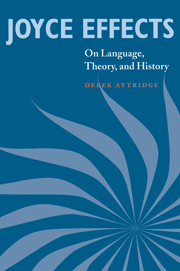Book contents
- Frontmatter
- Contents
- Acknowledgments
- References and abbreviations
- Preface
- Introduction: On being a Joycean
- Chapter 1 Deconstructive criticism of Joyce
- Chapter 2 Popular Joyce?
- Chapter 3 Touching ‘Clay’: reference and reality in Dubliners
- Chapter 4 Joyce and the ideology of character
- Chapter 5 ‘Suck was a queer word’: language, sex, and the remainder in A Portrait of the Artist as a Young Man
- Chapter 6 Joyce, Jameson, and the text of history
- Chapter 7 Wakean history: not yet
- Chapter 8 Molly's flow: the writing of ‘Penelope’ and the question of women's language
- Chapter 9 The postmodernity of Joyce: chance, coincidence, and the reader
- Chapter 10 Countlessness of livestories: narrativity in Finnegans Wake
- Chapter 11 Finnegans awake, or the dream of interpretation
- Chapter 12 The Wake's confounded language
- Chapter 13 Envoi: judging Joyce
- Works cited
- Index
Chapter 1 - Deconstructive criticism of Joyce
Published online by Cambridge University Press: 22 September 2009
- Frontmatter
- Contents
- Acknowledgments
- References and abbreviations
- Preface
- Introduction: On being a Joycean
- Chapter 1 Deconstructive criticism of Joyce
- Chapter 2 Popular Joyce?
- Chapter 3 Touching ‘Clay’: reference and reality in Dubliners
- Chapter 4 Joyce and the ideology of character
- Chapter 5 ‘Suck was a queer word’: language, sex, and the remainder in A Portrait of the Artist as a Young Man
- Chapter 6 Joyce, Jameson, and the text of history
- Chapter 7 Wakean history: not yet
- Chapter 8 Molly's flow: the writing of ‘Penelope’ and the question of women's language
- Chapter 9 The postmodernity of Joyce: chance, coincidence, and the reader
- Chapter 10 Countlessness of livestories: narrativity in Finnegans Wake
- Chapter 11 Finnegans awake, or the dream of interpretation
- Chapter 12 The Wake's confounded language
- Chapter 13 Envoi: judging Joyce
- Works cited
- Index
Summary
This talk was given at the 1984 James Joyce Symposium in Frankfurt, as part of a panel following Jacques Derrida's address, ‘Ulysses Gramophone’. The paper was originally entitled ‘Of’, but I have here appropriated the title of the whole panel. The references to that occasion are integral to the talk and have not been removed.
‘Amor matris: subjective and objective genitive’, thinks Stephen Dedalus in the role of part-time teacher in the ‘Nestor’ episode of Ulysses, contemplating his graceless pupil Cyril Sargent as the boy wrestles with his arithmetic problems and wondering at the mutual bond summed up in the ambiguity (which survives translation) of the phrase ‘the love of a mother’ (U 2.165–6). Later in the day, during his rhapsodic lecture on Shakespeare to a select audience in the National Library, the whole phrase surfaces again in Stephen's mind (U 9.842–3).
Thanks to the same ambiguity of ‘of’, the title A Portrait of the Artist as a Young Man, instead of designating a young man as he appears in a painting that is the work of his older self, might just refer to a painting by a youthful artist (a possibility not without critical consequences).
The title of Joyce's last book has, among its many meanings, a genitive that also works in two ways: the wake, or waking, of Finnegan may be that which he does as (reviving) subject or that which is done to him as (dead) object.
- Type
- Chapter
- Information
- Joyce EffectsOn Language, Theory, and History, pp. 22 - 29Publisher: Cambridge University PressPrint publication year: 2000



